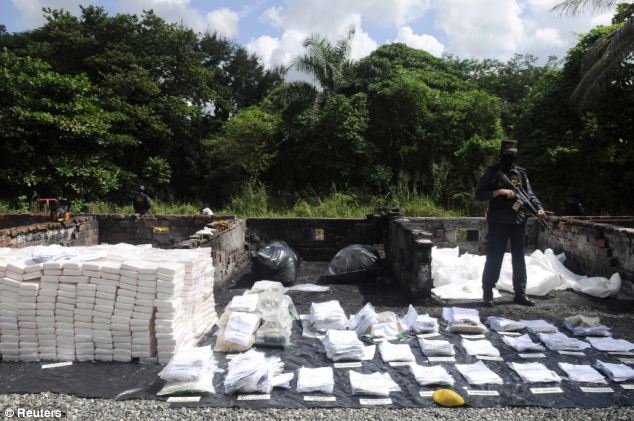Up in smoke: Police burn more than a ton of cocaine confiscated from Dominican Republic drug lords
- Police seized the Class A drug, worth around $250million from drug smugglers
- Armed officers stood by as the haul was set light
- The 1.2-ton haul was taken from drug lords in Peravia Province operation
By Emma Thomas
|
Holy smoke! Police set light to $250million of cocaine seized from an international organised crime ring.
Armed officers stood by as others burned 2,551lbs of the Class A drug inside a military base in Santo Domingo, Dominican Republic.
According to the attorney general, the 1.2-ton haul was confiscated from a drug smuggling gang in a recent police operation in Peravia Province.

Blaze: A firefighter walks away from the pile of Class A drugs police seized from drug lords in the Dominican Republic

Haul: Police seized 2,551 lbs of the Class A drug from an international drug smuggling gang in a recent police operation in Peravia Province
Officers piled the Class A drug into one area at the military base in the capital before lighting it with torches.
The popular tourist destination of Peravia Province is in the south of the Dominican Republic.
The coastal province, bordering the Carribean Sea, is home to nearly 300,000 people.
At the beginning of October, MailOnline reported a British man has admitted attempting to smuggle $30million (£80million) of cocaine into Europe from the Caribbean.
Rawson Watson, from Kent, faces 10 years in an American jail after he was caught boarding a Belgium-bound plane in the Dominican Republic with a tonne of cocaine in December 2011.
The drug was found spread across 20 suitcases in 1,001 separate packages, according to reports.
As well as a jail term, Watson could also face a fine of up to $10million.

Capital: The hillside community of Santo Domingo in Medellin, also known as Comunas

Hazardous: Officers and workers wore masks and respirators to protect themselves from the harmful smoke

Burning: An armed guard watches as workers pile up the packets of the Class A drugs ready to set light to them
This comes at a time as officials say the Caribbean is becoming a hot spot again for drug smuggling into the United States as a new generation of 'Cocaine Cowboys' use speedboats to smuggle the drugs into the States.
About 14 per cent of U.S.-bound cocaine shipments, roughly 42 tons, was trafficked through the Caribbean in the first six months of this year.
The Dominican Republic is emerging as a hub of the burgeoning trade, according to the U.S. Drug Enforcement Administration.
That was double the share of U.S.-bound cocaine that was shipped through the region during the first half of 2012, Vito Guarino, special agent in charge of the DEA's Caribbean division, said.
Colombian-led traffickers are also taking advantage of a region where they made deep inroads in the 1980s, before drug lords in Mexico began to dominate the trade by the late 1990s.
In the last year, U.S. law enforcement agencies have turned up the pressure on the Caribbean traffickers, with more Coast Guard patrols, as well as well as human and electronic intelligence, to detect illicit planes and boats.

A tidy sum: Packets of cocaine are closely guarded by officials from the country's police force
While experts have been predicting a rise in Caribbean trafficking for years now, Guarino said the evidence of an escalation was now unmistakable.
Most cocaine shipments into the region are smuggled aboard drug-laden speed boats, with two or more big engines, that roar across from the northern tip of South America in one or two days, Guarino said, often under cover of darkness.
Bales of cocaine are off-loaded to fishing boats or transferred to vehicles on deserted beaches.
'I was here when they were doing it predominantly by air. Now it's predominantly by go-fast (boats),' Guarino said.
In August, a U.S. Customs and Border Protection aircraft spotted a 30-foot long, go-fast boat near Puerto Rico loaded with 1,500 lbs of cocaine in waterproof bales. The boat, its three-man crew, and its cargo were seized by a British navy frigate, HMS Lancaster, patrolling in the area.

Stacked up: The huge seizure comes as experts say drug-smuggling in the Dominican Republic is on the rise
The lure of Puerto Rico is its status as a U.S. territory. Once drugs are smuggled onto the island they can head right to the U.S. mainland without going through customs.
About 500 lbs of coca paste, the raw ingredient for refined cocaine, was recently seized from a laboratory on a ranch on the outskirts of the Dominican capital recently.
Dominican authorities said it was the first full-scale cocaine processing operation ever uncovered in the Caribbean. Cocaine lab refining is usually done in South America, before the final product is shipped in bulk.
The similarities between Miami in the 1980s and Puerto Rico and the Dominican Republic today are striking, Guarino added.
'The Cocaine Cowboys, the Uzis, the shootouts that we used to have ... You're seeing the same violence,' Guarino said.
In 2011, Puerto Rico set a new record with 1,117 killings.
The homicide rate was more than six times the rate on the U.S. mainland and the government said almost half the murders were drug related. The crime rate has since fallen, but still remains three times higher than on the mainland.
-
 CCTV: Woman smashes face after push by cop
CCTV: Woman smashes face after push by cop
-
 Dog determined to make friends with boy with Down syndrome
Dog determined to make friends with boy with Down syndrome
-
 Thomas MUST hold hands in the car...
Thomas MUST hold hands in the car...
-
 Czech President's daughter denies being 'girl at sex party'
Czech President's daughter denies being 'girl at sex party'
-
 Firefighters destroy nests as hornets kill 41 people in ...
Firefighters destroy nests as hornets kill 41 people in ...
-
 Jon Stewart accuses Kathleen Sebelius of lying
Jon Stewart accuses Kathleen Sebelius of lying
-
 AUDIO: Cameraman's anti-Semitic rant at Jewish couple's...
AUDIO: Cameraman's anti-Semitic rant at Jewish couple's...
-
 What were you thinking? Original Starbucks Drake Hands video
What were you thinking? Original Starbucks Drake Hands video
-
 Graphic: News report shows horrific effects of new drug...
Graphic: News report shows horrific effects of new drug...
-
 Kanye West goes on a proper RANT defending himself on Jimmy...
Kanye West goes on a proper RANT defending himself on Jimmy...
-
 Snowden in secret meeting with Americans
Snowden in secret meeting with Americans
-
 Police arrest 'Shanghai Streaker' on streets of China
Police arrest 'Shanghai Streaker' on streets of China
-
 Boy, 15, kills himself after 'facing expulsion and being put...
Boy, 15, kills himself after 'facing expulsion and being put...
-
 EXCLUSIVE: Just 51,000 people completed Obamacare...
EXCLUSIVE: Just 51,000 people completed Obamacare...
-
 NSA leaker Edward Snowden emerges for the first time since...
NSA leaker Edward Snowden emerges for the first time since...
-
 Woman sues police after being shoved face-first into a jail...
Woman sues police after being shoved face-first into a jail...
-
 The secret government bunker hidden under a luxury hotel...
The secret government bunker hidden under a luxury hotel...
-
 The last photographs of tragic Formula 1 test driver who...
The last photographs of tragic Formula 1 test driver who...
-
 The photograph that shamed Mexico: Health director suspended...
The photograph that shamed Mexico: Health director suspended...
-
 Pentagon duped the nation for years with phony repatriation...
Pentagon duped the nation for years with phony repatriation...
-
 The great woman behind the Kennedy men: Rare and never...
The great woman behind the Kennedy men: Rare and never...
-
 Ariel Castro 'died of auto erotic asphyxiation' and NOT...
Ariel Castro 'died of auto erotic asphyxiation' and NOT...
-
 Heaven and L: Vatican releases medal to commemorate the...
Heaven and L: Vatican releases medal to commemorate the...
-
 Blood streaks, an abandoned sneaker and more grisly scene...
Blood streaks, an abandoned sneaker and more grisly scene...


































































































































































































































Geko747, Birmingham, United Kingdom, 12 minutes ago
Noooooooooooooooooooooooo!!!!!!!!!